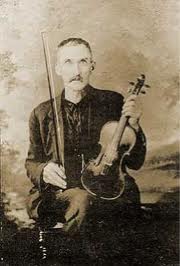Annotation:Poor Johnny's gone to War: Difference between revisions
m Text replacement - "garamond, serif" to "sans-serif" |
No edit summary |
||
| Line 1: | Line 1: | ||
== | __NOABC__ | ||
<div class="noprint"> | |||
<p><font face="Century Gothic" size="4"> Back to [[{{BASEPAGENAME}}]] </font></p> | |||
</div> | |||
---- | ---- | ||
<p><font face=" | {{#lst:{{PAGENAME}}|abc}} | ||
'''POOR JOHNNY'S GONE TO (THE) WAR.''' AKA and see "[[Tommy Love]]," "[[John Lover]]('s Gone]]," "[[John's Lover is Gone]]," "[[John the Lover]]." | ---- | ||
<div style="page-break-before:always"></div> | |||
<p><font face="Century Gothic" size="2"> | |||
<div style="text-align: justify; direction: ltr; margin-bottom: 90px; margin-left: 70px; margin-right: 120px;"> | |||
<br> | |||
'''POOR JOHNNY'S GONE TO (THE) WAR.''' AKA and see "[[Tommy Love]]," "[[John Lover]]('s Gone]]," "[[John's Lover is Gone]]," "[[John the Lover]]." American, Song and Reel. USA; southwestern Va, western North Carolina. D Major. AABBCC ('C' part added by Malcolm Owen). This southwestern Virginia song/tune has currency under several closely related title variants. Galax, southwest Virginia, fiddler Emmett Lundy [http://www.oldtimemusic.com/FHOFLundy.html] (1864-1953) recorded "Poor Little Johnny's gone to the War" for Alan Lomax, Joseph Liss and Jerry Weisner in August, 1941. accompanied by his sons Kelly on guitar and vocals and Geedy on banjo. Emmett Lundy [http://www.oldtimemusic.com/FHOFLundy.html] (1864-1953) had a mentor by the name of Greenberry Leonard, of Oldtown, near the Lundy homestead, who was an elderly man when Lundy was learning the fiddle and from whom he obtained many of his tunes. Through Lundy, the Grayson County, Va., fiddle tradition can be traced to the first half of the 19th century. [[File:lundy.jpg|400px|thumb|right|Emmett Lundy]] | |||
<br> | <br> | ||
<br> | <br> | ||
| Line 10: | Line 18: | ||
According to one (probably apocryphal) source, the melody goes back to the time of Confederate cavalryman General Jeb Stuart during the Civil War (Kinney Rorrer). Stuart was known to have had a banjo player in among his attendants. | According to one (probably apocryphal) source, the melody goes back to the time of Confederate cavalryman General Jeb Stuart during the Civil War (Kinney Rorrer). Stuart was known to have had a banjo player in among his attendants. | ||
<br> | <br> | ||
< | </div> | ||
</font></p> | </font></p> | ||
<p><font face=" | <div class="noprint"> | ||
''Source for notated version'': | <p><font face="Century Gothic" size="2"> '''Additional notes''' </font></p> | ||
<p><font face="Century Gothic" size="2"> | |||
<font color=red>''Source for notated version''</font>: - | |||
<br> | <br> | ||
<br> | <br> | ||
</font></p> | </font></p> | ||
<p><font face=" | <p><font face="Century Gothic" size="2"> | ||
''Printed sources'': | <font color=red>''Printed sources''</font> : - | ||
<br> | <br> | ||
<br> | <br> | ||
</font></p> | </font></p> | ||
<p><font face=" | <p><font face="Century Gothic" size="2"> | ||
''Recorded sources'': <font color=teal>County CD-2711, Kirk Sutphin - "Old Roots and New Branches" (1994). Heritage 070, Luther Davis - "The Old Time Way" (1986. Various artists). Library of Congress AFS 04946 B02, Emmett Lundy (1941). Marimac Records 9035 (cass.), Double Decker String Band - "For an Old Time, Call" (1990). Rounder 0010, "The Fuzzy Mountain String Band" (1972. Learned from Taylor Kimble.).</font> | <font color=red>''Recorded sources'': </font> <font color=teal> - County CD-2711, Kirk Sutphin - "Old Roots and New Branches" (1994). Heritage 070, Luther Davis - "The Old Time Way" (1986. Various artists). Library of Congress AFS 04946 B02, Emmett Lundy (1941). Marimac Records 9035 (cass.), Double Decker String Band - "For an Old Time, Call" (1990). Rounder 0010, "The Fuzzy Mountain String Band" (1972. Learned from Taylor Kimble.). </font> | ||
<br> | <br> | ||
<br> | <br> | ||
</font></p> | </font></p> | ||
<p><font face="sans-serif" size=" | <p><font face="sans-serif" size="3"> | ||
See also listing at:<br> | See also listing at:<br> | ||
Jane Keefer's Folk Music Index: An Index to Recorded Sources [http://www.ibiblio.org/keefer/j05.htm#Johlogo]<br> | Jane Keefer's Folk Music Index: An Index to Recorded Sources [http://www.ibiblio.org/keefer/j05.htm#Johlogo]<br> | ||
Hear Emmett Lundy's 1941 Library of Congress recording at Slippery Hill [https://www.slippery-hill.com/recording/poor-little-johnnys-gone-war]<br> | Hear Emmett Lundy's 1941 Library of Congress recording at Slippery Hill [https://www.slippery-hill.com/recording/poor-little-johnnys-gone-war]<br> | ||
</font></p> | </font></p> | ||
<br> | <br> | ||
---- | ---- | ||
== | <p><font face="Century Gothic" size="4"> Back to [[{{BASEPAGENAME}}]] </font></p> | ||
</div> | |||
__NOEDITSECTION__ | |||
__NOTITLE__ | |||
Latest revision as of 03:13, 10 November 2019
X:1 T:Poor Little Johnny S:Emmett Lundy (1864-1953, Galax, Va.) M:C| L:1/8 D:Library of Congress (1941) Z:Transcribed by Andrew Kuntz K:A e-||e e/f/e c/B/ A>A A>e-|e/f/e/c/ Bc A>A A>e-|e/f/e/f/ ef A>A A>e-|e/c/e/c/ Bc A>A A>B-|| B>B B/A/B/c/ Ac/A/|B/A/F (3E/F/G/ A>A A2|[M:3/4]Bc A>A A2|B>B BB c/d/c/e/| [M:C|]B/A/F/A/ E2-E/A/c/A/ Bc|A>A A-A/B/-|B>B B/A/B/c/ Ac/A/|B/A/F (3E/F/G/ A>A A2| [M:3/4]Bc A>A A>B-|B>B BB c/d/c/e/|[M:C|]B/A/F/A/ E2-E/A/c/A/ Bc|A>A A-A/{c}e/-||

The tune was in the repertory of southwestern Virginia fiddlers Luther Davis, Kahle Brewer and Taylor Kimble under this title, and, also as “Poor Little Johnny Has Gone to the War,” from Bertie Mae Dickins of Ennice, North Carolina. Eric Olson, Malcolm Owen, and Tom Thompson made a field recording of Laurel Fork, Virginia, musician Stella Kimball (with Taylor Kimball, fiddle, and Ivey Kimball, guitar) playing "Poor Johnny's gone..." in October, 1968 (AFS 14,146), as did Tom Carter & Blanton Owen in 1973 (AFS 18, 638).
According to one (probably apocryphal) source, the melody goes back to the time of Confederate cavalryman General Jeb Stuart during the Civil War (Kinney Rorrer). Stuart was known to have had a banjo player in among his attendants.
